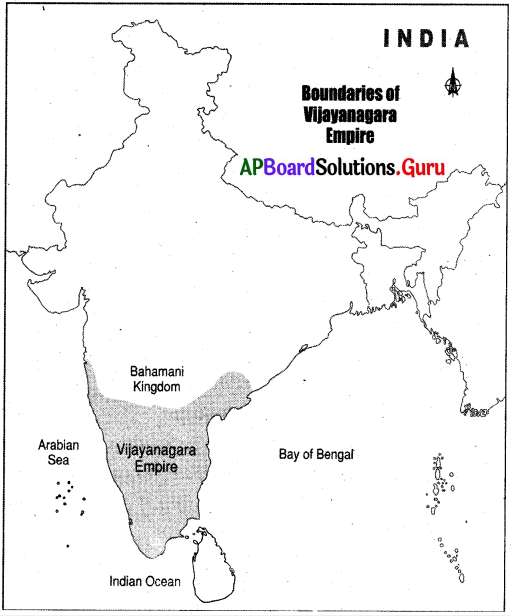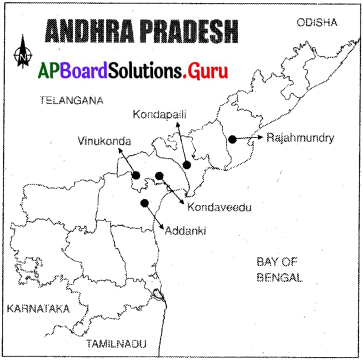SCERT AP 7th Class Social Study Material Pdf 6th Lesson Vijayanagara Empire Textbook Questions and Answers.
AP State Syllabus 7th Class Social 6th Lesson Questions and Answers Vijayanagara Empire
7th Class Social 6th Lesson Vijayanagara Empire Textbook Questions and Answers
Improve Your Learning
I. Answer the following questions.
Question 1.
Discuss the conflict between Vijayanagar and Bahaman kingdoms.
Answer:
- The struggle between Vijayanagara and Sultanate of Madurai lasted for about four decades.
- The disputes/ conflicts started during the time of son of Bukkaraya -1, Kumarakampana.
- Kumarakampana destroyed Madurai Sultans and freed people from the Sultan misrule.
- The dispute arises between Vijayanagara and Bahmani kingdom over Raichur Doab, the region between the rivers Krishna and Tungabhadra.
- And also over the fertile areas of Krishna – Godavari delta led to this long drawn conflict.
Question 2.
Write about the Nayakar system in Vijayanagar kingdom.
Answer:
In Vijayanagara empire Nayakas and Amara Nayakas are there.
Nayakas:
- They were military chiefs usually mentioned law and order in their areas of control.
- They maintained forests and kept armed supporters.
- They use to control and expand fertile land and agricultural settlements.
- They usually submitted to kings.
Amara Nayakas:
- The Amaranayaka system was a major political innovation of Vijayanagara empire.
- These Amaranayakas form military commanders, who are given territories to be governed by the Raya.
![]()
Question 3.
Describe the development of trade and commerce under the Vijayanagar rulers.
Answer:
- Vijayanagara kingdom was a great center of trade.
- Inland, Coastal and Overseas trade led to the general prosperity.
- There were a number of seaports on the Malabar coast, the chief being Cannanore.
- Commercial contacts with Arabia, Persia, South Africa and Portugal on the West and Burma, Malaya Peninsula and China on the east flourished.
- Cotton and Silk, spices, rice iron, saltpeter and sugar were the chief items exported.
- Vijayanagara kings imported horses, pearls, copper, coral, mercury, China silk and velvet clothes.
- The art of shipbuilding developed.
Question 4.
Read the concept of “Art and Music” in the lesson and compare it with the present.
Answer:
During the Vijayanagara period Carnatic music is famous. But at present due to change the interest of the people rock and pop music are famous.
At that time Bharata Natyam, Kuchipudi, Yakshaganam, Perni Natyam are famous. But at present breakdance and disco dance styles are famous.
Question 5.
Write about the administration of Sri Krishna Deva Raya.
Answer:
- Sri Krishna Devaraya was not only a great warrior but also a good administrator.
- He took the help of his minister Saluva Timmarusu, known as Appaji, in reorganizing the administrative system.
- The chief adviser to the king was Prime Minister. ‘
- Council of Ministers assisted the king in administration.
- He maintained friendly relations with the foreigners.
- He respected all religions.
- He was a great patron of literature and art.
- He maintained Ashtadiggajas, a great 8 poets in his court.
- The empire was divided into different administrative units called Mandalas, Nadus, Sthalas and finally into Gramas.
Question 6.
Describe the literary services of Sri Krishna Deva Raya.
Answer:
- Sri Krishna Devaraya was not only a great monarch, soldier and a stateman but was also an accomplished poet and scholar himself.
- He was a great patron of literature and art.
- He was known as Andhra Bhoja.
- His famous quote was “Desa Bhasalandu Telugu Lessa.”
- Eight eminent scholars known as “Astadiggajas” were at his royal court.
- Krishna Devaraya himself authored a telugu work ‘Amuktamalyada’ and Sanskrit works, ‘Jambavathi Kalyanam’ and ‘Usha Parinayam’.
- He patronized various writers and poets in his court called ‘Bhuvana Vijayam’.
Question 7.
Locate the boundaries of Vijayanagara empire in India map.
Answer:

Question 8.
What are the architectural traditions that inspired the architects of Vijayanagar?
Answer:
- The rulers of Vijayanagara made many innovations in the architectural traditions.
- They added many new features in the temple architecture.
- The rulers of Vijayanagara built mandapas or pavilions.
- Besides there were long and pillared corridors that ran around the shrines.
- There were two main temples : The Virupaksha temple and’Vithala temple.
- During the Krishna Devaraya time he built a hall in front of the main shrine to these temples.
- This hall was decorated with delicately carved pillars.
Question 9.
Why did Bahamani kingdom breakup and what was the result?
Answer:
The Bahamani kingdom was breakup due to the following reasons :
- Royal officers were appointed in each province.
- They were aimed to increase the control of Sultan over the nobles and provinces.
- Most of the forts were under the control of these officers.
- Allowances were reduced to the nobles who shirked their responsibility. This was disliked by the nobles.
- Muhammad Gawan was very strict and gave punishments to his nobles. This made them to revolt against Gawan.
- So, the Deccan nobles organised a plot against Gawan.
- They induced the Sultan to punish him with death.
- Muhammad Shah-Ill died in 1482 CE. His successors were weak.
Result:
So the Bahamani kingdom disintegrated into five kingdoms namely :
- Ahmednagar,
- Birar,
- Bidar,
- Bijapur,
- Golkonda.
![]()
Question 10.
Describe the services of Reddy kings to the people.
Answer:
- The Reddy rulers patronised and protected Hinduism and its institutions.
- Telugu literature blossomed under the Reddy kings.
- The administration was carried according to the “Dharmasutras”.
- One sixth of agricultural surplus was levied as tax.
- Under the reign of Anapota Reddy, customs-duty and taxes on trade were lifted.
- Sea trade was carried through the port Motupalli.
- Celebrating “Vasantosavalu” was revived during the rule of Anavema Reddy.
- Caste systerp was observed.
II . Choose the correct answer.
1. Sri Krishna Deva Raya belongs to this Vijayanagar dynasty.
a) Saluva
b) Thuluva
c) Aravedu
d) Sangama
Answer:
b) Thuluva
2. The kingdom of Vijayanagara was established during the reign of ………….
a) Alauddin Khilji
b) Muhammad Bin Tughlaq
c) Firoz Shah Tughlaq
d) Ghiyasuddin Tughlaq
Answer:
b) Muhammad Bin Tughlaq
3. Rakshasathangadi or Tallikota war broke out in the year.
a) 1563 A.D
b) 1564A.D
c) 1565 A.D
d) 1566 A.D
Answer:
c) 1565 A.D
4. Madura Vijayam is a book written by
a) GangaDevi
b) Tirumalamma
c) Hanumayamma
d) Nagalamba
Answer:
a) GangaDevi
5. The founder of the Bahamani kingdom was
a) Alauddin Mujahid Shah
b) Ahmed Shah
c) Alauddin Bahman Shah
d)FirozShah
Answer:
c) Alauddin Bahman Shah
III. Match the following.
| Group-A | Group-B |
| 1. Krishnadevarays | a) Chief Minister |
| 2. Muhammad Gawan | b) Capital city of Bahamani |
| 3. Vijayanagara empire | c) Andhra Bhoja |
| 4. Gulbarga | d) Persian |
| 5. Abdul Rajjak | e) Tungabhadra |
Answer:
| Group-A | Group-B |
| 1. Krishnadevarays | c) Andhra Bhoja |
| 2. Muhammad Gawan | a) Chief Minister |
| 3. Vijayanagara empire | e) Tungabhadra |
| 4. Gulbarga | b) Capital city of Bahamani |
| 5. Abdul Rajjak | d) Persian |
7th Class Social 6th Lesson Vijayanagara Empire InText Questions and Answers
7th Class Social Textbook Page No. 78
Question 1.
Get the information about the first Surveyor General of India from your library or Internet.
Answer:
Collin Mackenzie was appointed first Surveyor General of India to the Madras Presidency in 1810.
7th Class Social Textbook Page No. 81
Question 2.
Play a drama of Astadiggajas with the help of your teacher.
Answer:
7th Class Social Textbook Page No. 83
Question 3.
There are so many ancient and modern Indian women who are role model to us. Prepare a list of great India women with the help of your teacher and parents.
Answer:
Sita, Savitri, Arundhathi, Anasuya, Ahalya, Gargi and Maithreyi etc.,–these are the great woman from our Indian mythology.
Jhansi Lakshmi bai, Rani Rudrama Devi, Razia Sultana etc., — are the great woman from our historical period.
Indira Gandhi, Kiran Bedi, Mother Teresa, Kalpana Chawla, Sushma Swaraj, Lata Mangeshkar, M.S. Subbu Laxmi, P. Suseela, Karanam Malleswari etc. are the great women in modern times in India.
![]()
7th Class Social Textbook Page No. 86
Question 4.
Locate the cities ” Kondapalli, Rajamundry, Kondaveedu, Vinukonda, and Addanki in present Andhra Pradesh Map.
Answer:

Think & Respond
7th Class Social Textbook Page No. 77
Question 1.
Why did Vidyaranya want to establish new kingdom on the bank of Tungabhadra river?
Answer:
Vidyaranya told the brothers Hari Hara Raya and Bukkaraya the South Bank of the River Tungabhadra area was sacred.
And he advised them to establish a new kingdom on the bank of Tungabhadra river.
Question 2.
Under which dynasty Harihara-1 and Bukkaraya-1 worked?
Answer:
Hari Hara Raya – I and Bukkaraya – I worked in the court of the Kakatiya king Pratapa Rudra II of Warangal in 1323 CE.
After defeat of Kakatiya kingdom, they worked under the control of Muslim rule. Later they established Vijayanagara Kingdom.
7th Class Social Textbook Page No. 81
Question 3.
Why were there constant wars between Vijayanagara Empire and the contemporary Muslim rulers?
Answer:
The main reason for the constant wars between Vijayanagara and contemperory rulers were :
- Both the kingdoms wanted to control of fertile and rich Raichur doab lying between rivers Krishna and Tungabhadra.
- They also wanted to conquer Golconda because of its diamond mines.
![]()
Question 4.
What were the effects of Taliikota war? Discuss with your teacher.
Answer:
The effects of Taliikota war :
- Aliya Ramaraya was defeated.
- He and his people were killed mercilessly.
- Temples were destroyed.
- Rama Raya was imprisoned and executed.
- Tirumala Raya and Venkata Raya sons of Rama Raya escaped from the war and ran away to Penukonda.
- The city of Vijayanagara was destroyed by the Muslim kings.
- This battle is also known as Rakshasa Thangadi.
- This battle was generally considered to mark the end of the Vijayanagara empire.
7th Class Social Textbook Page No. 85
Question 5.
Discuss the contribution of the Vijayanagara empire to Indian art and. Architecture.
Answer:
- The temple building activity of the Vijayanagar rulers produced a new style called the Vijayanagar style.
- Though often characterized as Dravida style, it had its own distinct features.
- The distinct features of the architecture were the pillars.
- The horse was the most common animal to be depicted on the pillars.
- The temples had a Mandapam or Open Pavilion with a raised platform, generally meant for seating the deity on special occasions.
- The Rajagopurams, towers in commemoration of the visit of emperors in different corners of the empire are also important examples.
- Amman Shrine was meant for the consort of the God.
Project Work
Collect the information about temples costructed in Andhra Pradesh with the influence of Vijayanagara style.
Answer:
In Andhra Pradesh the empire built the Mallikarjuna Temple at Srisailam, Upper Narasimha Temple and Lower Narasimha Temple at Ahobilam, Veera Bhadra Temple at Lepakshi and Venkateswara Temple at Tirupati and others.
The Veerabhadra temple of Lepakshi, which was built by the brothers Viranna and Virupanna, is dedicated to Veerabhadra. it is an example of the Vijayanagara architectural
